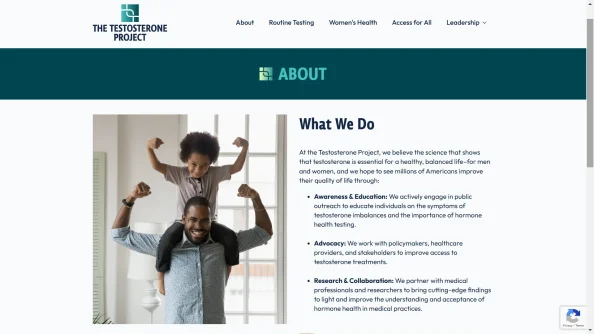madman
Super Moderator

About - The Testosterone Project
At the Testosterone Project, we believe that testosterone is essential for a healthy, balanced life for men and women. Learn more about how we advocate for you.
The Testosterone Project Launches on National Testosterone Awareness Day, November 17
New Nonprofit Founded by Leading Testosterone Experts Seeks to Provide Equal Access to Care for Both Men and Women...
RALEIGH, N.C., Nov. 15, 2024 (GLOBE NEWSWIRE) -- The Testosterone Project, a new nonprofit founded by leading experts in the fields of testosterone treatment and general metabolic health, launches in conjunction with National Testosterone Awareness Day on November 17. The national nonprofit organization will focus on addressing the stigma and misconceptions surrounding testosterone, advocating for comprehensive testing, and supporting women’s equal access to testosterone deficiency treatment.
The Testosterone Project’s executive board is comprised of industry leaders, medical professionals, and passionate advocates dedicated to expanding access to testosterone treatments and testing. Shalin Shah, longevity expert and CEO of Marius Pharmaceuticals, is joined by Dr. Mohit Khera, a renowned urology expert and professor, and Dr. Kelly Casperson, a urologist and prominent advocate for women’s health. The board will provide scientific expertise, educational resources, and support in promoting testosterone health.
The project also has an extensive, growing advisory board that consists of longevity experts in urology, cardiology, functional medicine, and more. Since testosterone plays such a broad role in metabolic health, the executive board has brought in experts across the entire spectrum, including patients, to help drive the cause.
The Testosterone Project comes at a critical time, addressing the testosterone deficiency health crisis and widespread lack of clear, unbiased information for both men and women. The nonprofit’s long-term goals include descheduling testosterone to improve access and reduce regulatory barriers for testosterone testing standards on blood panels.
The result helps diagnose deficiency and provides insights into overall health, serving as a key marker for underlying conditions. It also supports long-term well-being and makes FDA-approved testosterone available for women who are suffering from the same broad symptoms and health risks as men. The Testosterone Project believes that increasing public and healthcare awareness around testosterone deficiency is key to reducing the stigma and making the therapy mainstream.
Descheduling testosterone would simplify prescribing, increase access, and reduce the stigma around testosterone therapy:
- For healthcare providers: could lead to fewer regulatory hurdles
- For patients: more accessible and affordable treatment options
- For the industry: Fewer regulatory limitations that might encourage further innovation in testosterone therapies
Through lobbying efforts, partnerships with medical organizations, awareness campaigns, and educational outreach to lawmakers and the public, The Testosterone Project will spread awareness and create momentum for critical policy changes surrounding testosterone classification.
For women, there are zero FDA-approved testosterone therapies and limited awareness. By addressing this disparity, The Testosterone Project ensures women have equitable access to hormone therapies that may improve quality of life, combat symptoms of deficiency, and support overall health. According to the National Library of Medicine, women have experienced improved mood, libido, and physical well-being after being on testosterone therapy, underscoring the importance of equality in hormone treatments for men and women.
Executive Board Member Shalin Shah comments, “The time to take a stand is now. The science is overwhelmingly clear on how important this metabolic hormone is and the impact it can make on the overall health of our population. Through education and awareness, we can not only improve the lives of millions but actually start to address some of the ticking time bombs when it comes to our healthcare system’s spending.”
To support The Testosterone Project’s efforts, the public can sign up for newsletters to learn how to get involved, participate in petitions advocating for regulatory changes, and spread awareness through social media. The project will also offer educational materials or webinars to engage the public.
For more information on The Testosterone Project, visit testosteroneproject.com.


















